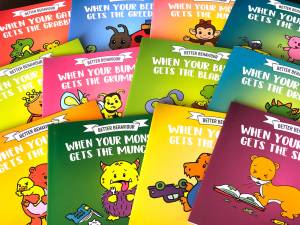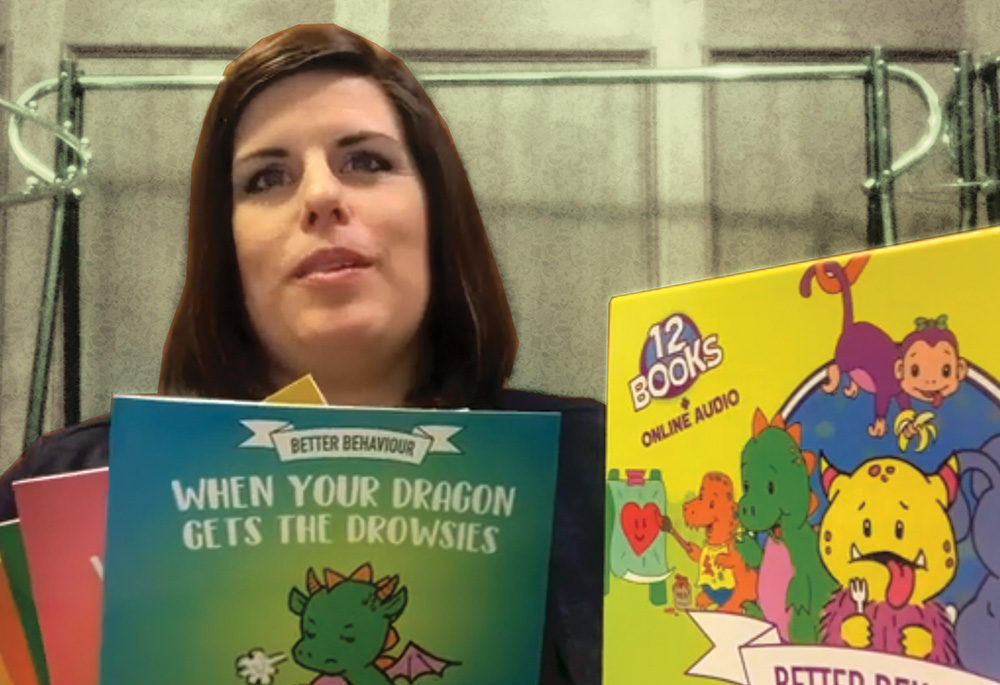Tackling tough topics with kids, either as an educator or a parent, is never easy. But with the help of the Better Behaviour series by PJ Wright, those heavy conversations are a lot easier to approach. These 12 little books inspire reflection, discussion, and self-improvement. Find out why this talented author created the series!
What gave you the idea to write Better Behaviour?
In short, it was my 6 (now 7) year-old daughter Jodie (who has Autism, Hyperlexia, and Sensory Processing Disorder) who inspired me with the whole concept and characters. As a matter of fact, all the scenarios used in the Better Behaviour books were based on actual real-life problem-solving opportunities that had occurred either in our home or in the classroom. Jodie was also very much involved in the visual design process of the books as well. She was the one who insisted that I use all the colourful fonts and comical animal characters.

Originally, I had planned to create these books just for Jodie, her little sister Holly, and a few other parents/children that I had worked with professionally; but it did not take long before I realized just how fun and helpful these little resources really were and that more people needed to be able to access them too. Fortunately, DCCED agreed with me and has embraced this same vision. Now the Better Behaviour series is available for all parents/teachers and children to enjoy and benefit from!
How has your experience with your own children shaped your career?
My first career, believe it or not, was hairdressing. I did enjoy it, but my passion quickly changed once I was blessed with my second child, a son (now in his 20s) who was diagnosed with Pervasive Developmental Delays and Autism. Back in the 1990s, extraordinarily little information and resources were available so I made it my mission to learn as much as I could about the disorder and then share my findings with anyone who needed it or was willing to listen. As time went on, this passion for Autism and early child development grew and evolved until it eventually led me to many professional opportunities where I have been able assist many children (and adults) with various developmental needs. As you can imagine, being able to create and share resources like Better Behaviour is truly something I am excited about.
What do you find is the most challenging topic to tackle with kids who have behavioural difficulties?
I would say that for most young children it is the topic of patience. This concept is complex because it usually requires a level of self-regulation skills that are not fully developed in most of these little ones yet. Many challenging behaviours are connected to having to “wait for something”.
Speaking of behaviour, one valuable thing I have learned is that behind every behaviour, there is always an emotion. Whenever we can identify our emotions and their source, the easier it is to develop the problem-solving skills necessary to come up with successful solutions. Tackling just a behaviour rarely ever solves it. It is not until we take the time to look deeper into what is behind it that we are truly able to make a difference.
How can parents and educators use these books as a resource to address children’s developmental issues?

The unique thing about the Better Behaviour series is that it uses a remarkably simple yet effective 3-step teaching pattern. First, it introduces children to a common childhood problem-solving opportunity. Second, it presents children with questions like: “How do you feel? What could he/she do? Could he/she try something new?” This step inspires children to naturally reflect, discern, and share their own thoughts and ideas about what the character should do next. Then in the third step, children are introduced to a few possible solutions that the character decides to try. At the end of each book, the character is then presented with a “Good Choices Award” for making good choices. This positive ending can provide children with feelings of empowerment and achievement because it could very well have been their ideas that influenced that character to succeed.
The other component to this series that make it a great little resource tool is the use of rhymes and a catchy rhythmic cadence. This is especially helpful for children with comprehension difficulties. Being able to recognize the predictable patterns in each book can bring about greater confidence and attention. For children with limited attention spans, the books are also kept short with concepts given in bite-sized pieces.
How can this series be used to start a bigger conversation about mental health?
“Where do I start? How do I bring it up? Are they too young?” Conversations about mental health can often be difficult to have with young children. The nice thing about the Better Behaviour series is that it introduces the topic of big feelings and emotions in a natural and age-appropriate way. Each book also presents children with some simple but important questions that they can reflect on and answer. This golden little conversation starter can be used as a perfect opportunity to bring up many other health and well-being questions that you or your kids might have.

